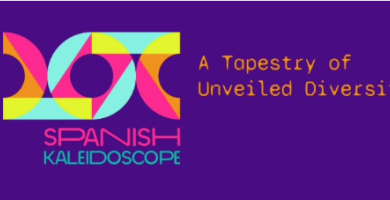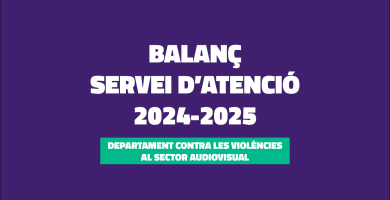
AMPARO VILLAPÚN: "Film production is extremely fast and dynamic, and it is very important that the controller knows how to adapt to this dynamism."
This month we interview Nicos Beatty, director and founder of the production company Soul Pictures and Amparo Villapún, production controller with over 25 years’ experience in the audiovisual sector. We talk with them about the position of controller and about the training courses for audiovisual professionals that the production company offers.

A lot of people who don’t work in the audiovisual world probably don’t know what a controller does. So what is a production controller in the audiovisual industry and what are their main duties?
Nicos: To summarize, we could say that the controller coordinates the budget control and establishes the coordination tool for this budget control, subject to the needs and decisions that the production director has to take to ensure the feasibility of the audiovisual or film production. But I think Amparo can tell you in more detail.
Amparo: Nicos defined it quite well. It is the person who coordinates the budget control. There are many specific, tax and accounting duties, but the main aspect is that it is all geared toward obtaining the cost report or cost control, which is the tool with which the production director is going to manage the production.
Does this figure work with all the audiovisual production departments or just with some?
A: You have to be in contact with all the departments, because you need an overview of the whole production, but you basically work very closely with production, art and costumes and, in some cases, with make-up and hairdressing if they manage their own departmental budget. This normally tends to be delegated or assigned to production. It is also related to locations when they are separate from production and costumes.
What skills does this figure need?
A: Basically four. The most important is to be open-minded. You must be willing to receive all kinds of inputs and situations. Film production is very dynamic and very fast. You have to have a mind which is willing to confront all kinds of situations. Second, what I call a capacity to reset and above all adapt. Each production is different and I believe that it is extremely important for the controller, whenever they begin a new production, to have this capacity to reset in relation to the previous production and to reconsider all the work systems with a view to measuring all the procedures, adapting to each production. The third skill is anticipation. You must be able to foresee from where the possible incidents that always occur in film production are going to come. Finally, a capacity for organization and dynamism. Film production is extremely fast and dynamic, and it is very important that the controller knows how to adapt to this dynamism.
This is something that tends to occur in film production in general, since it is a living thing to which you have to adapt constantly, you know? You always have to adapt to the circumstances, even in aspects other than budget control.
N: Exactly. There is an issue of adaptability to each situation which always requires you to have the necessary skills, and I always say that I have to dance the cha-cha-cha whenever I am in charge of a production. I know how to go from one side to the other (laughter). And yes, an essential requirement is the ability to adapt to a series of circumstances which can be due to budgetary or organizational questions, or even to the story being explained in the film. A film production combines elements which sometimes go beyond what is strictly speaking earthly. You need psychological skills on dealing with certain departments and you must know how to address certain quite delicate situations which, to a certain extent, affect all the planning that you may have done. You obviously cannot do all this if you have not prepared the ground and established a structure in line with what you can then more or less expect. If you have more or less planned and structured this well, then the cha-cha-cha is much easier. You have to be able to foresee a little how the tide of the production is going to come in.
What are the main difficulties that a controller encounters on doing their job?
A: The most common problem is that we don’t receive the information or that it is incomplete. The controller needs all the production information and it is essential to know what is being done, what resources are being handled, what changes are taking place as regards the shoot. In short, what resources are being used. This lack of information makes our work very difficult, because in the end we are the path to convert the entire production into economic terms. If we do not have this information, we cannot convert it into numbers in a cost report. How can we depict everything that has been done in economic terms, if we do not know what has really been done? This is one of the main problems that you can encounter in a production.
Also, when the production is not well planned, if the planning was not carried out as thought, there is a mismatch between the plan and what is really being done. As we said before, one of the qualities that a controller needs is the ability to see from where all these mismatches are going to come. If they come from somewhere else, you are a little unprotected in so far as you do not know what resources have been used or are going to be used. Then you are improvising and this makes the work very difficult.
What differences can this figure find in their work as a controller between film and television, since they are two worlds which work in a different way?
A: Yes, there is a big difference. In terms of deadlines, for example. In television you work much more with the long term, because you normally programme for seasons of 13 weeks. It is different with films; it is all very short term, very fast and dynamic. With television, the decisions are taken more slowly. The production is much more dynamic in film than in television, although television is also fast, but film is even faster because on setting up a project which lasts three or four months the time with which you work is shorter.
Film is also more focused on the project cost while television is geared toward project profitability. For example, when you work with game shows or even series, it is more a question of audience, of the profitability in relation to the income generated in advertising. Also, the launch is much faster in film because the television channels are already established. I participated in the launch of the private television channels in 1989 and the truth is that it was intense, but nothing to do with the launch, without undermining television, of a film project.
There is also another difference which is that, with film, when you launch the project, you have to introduce or establish the procedures from scratch, whereas in television they are already established because the company and the channel already have their methods and administrative procedures and the truth is that you notice the difference.
What specific training should a controller have?
A: There are two aspects. One is the technical aspect that any controller in any sector must have, which we could call the accounting and tax part, and the administrative part. The other is that of the specific sector. This happens in all sectors, but in the audiovisual industry it is very specific and I think that it is recommended to have technical knowledge about what a camera car or a crane is… Also something about lighting. You need specific technical knowledge about what resources are used in production; this makes the work much easier. Although it is not absolutely essential, it is highly recommended.
As a production company, you have started a specific training course for controllers. What does your course consist of and why did you decide to set it up?
A: The course uses what I believe to be quite a novel methodology, compared with other courses on management control, because it starts from production. Management control courses are given from the point of view of budget control, accounting, taxation. This course, starting from production and the screenplay, the shooting plan and the breakdowns of the directors, is going to explain the work carried out from then by the controller. Always using well-known case studies, we explain the administrative processes which are followed as regards recording invoices, tax matters, production accounting, human resources. This leads to the final tool of the controller and the production director, which is the cost report. This truly reflects what the production is and where it wants to go. We should not forget that management control does not just explain or provide an “autopsy”, if you will excuse the expression, of what has been done in the previous weeks, but also what is expected in the following weeks. Here there is important work with the production director. The course explains how to create this cost report and how to get to this tool.
And why did you decide to embark on training, being a production company?
N: Since I left my production and film school, one of my vocations has been teaching, explaining the knowledge acquired to new generations. Proof of this is that I have been a film lecturer at the Ciudad de la Luz film school, at the ESCAC, at the former CEC, we have done things with ECAM and the TAI University College of Arts in Madrid. We are now about to launch another really fun and very tough action film directing course at the Basque Country film school. We are also starting courses with the San Sebastián ESCIVI school. Above all, I think that it is interesting to share the knowledge that you may have acquired with students or professionals who, at a certain time, want to specialize in very specific matters. This is something that came from some time back and which emerged as a new format of courses with the pandemic. We moreover understood that many different types of profiles really had a need and that a specific, fully online format could be very good for them.
All the classes are currently being offered on line. How has it been and what is the profile of the people who sign up for these courses?
N: The online aspect has been fantastic. We are offering the controller course with the Association of Audiovisual Production Professionals, APPA. We have also had requests from other institutions which we will announce in the future. There has been quite a boom and we are considering the possibility of offering several courses with some potential at certain times throughout the year.
As regards the profile, we basically see three fairly clear profiles. First, students of audiovisual, journalism, advertising, etc., who are interested in studying certain matters in depth which precisely many curricula either just refer to in passing or sometimes practically disregard. Having more well-known tools is useful for them to gain access to the professional labour market. Then, there is the professional who already has some baggage and a track record, but who could use more in-depth knowledge with a view to having a certain specialization in the subject in question with a more thought-out perspective. The very inertia of production often means that you are stuck in a rut. And the third profile would be professionals from other parallel or similar industries, or sometimes from others which do not have much to do with audiovisual and who are in a retraining process and it is of interest to them because maybe they have a certain knowledge of accounting, but a certain conversion would be good for them so as to be able to have a chance to enter the audiovisual market.
Talking about the production company, how and when was Soul Pictures created?
N: Soul Pictures was established with the aim of generating a space in which we could work on the film sector’s business plan, from the initial idea until the film is in the cinema and the audience is watching and appraising it. We also wanted to work on the synergies that this generates. I already had a very long track record with extremely high-level international films, in which we were present in Barcelona, our wonderful city, and there was a lot of competition to receive these projects from other both national and international locations. Our mission was to do everything possible for that specific project to come to Barcelona and to bring it to fruition, with considerable success in general. This led me to enter a sort of loop, which I always go into with this type of projects, but with the personal desire to create a space in which we could develop projects from scratch.
Then, in the middle of all this, we had stages with a great deal of innovation, with quite advanced treatments, with transmedia contents for example. We also covered certain advertising pieces. In the end, our main specialization is development, the financing stage, working above all with financial and project management tools. It is true that we also have other departments more geared toward sales and festivals. That is more or less the outline of Soul Pictures.
Do you support films throughout the process?
N: Absolutely. We receive many projects at very different stages, both before and after being produced. We perform a specific analysis of each of them to see at exactly what point on the timeline of the business plan this specific feature film is. What elements does it need to move to the next level? And we apply a completely customized treatment. This is the development consultancy part. According to the situation of each film, we use a custom-designed approach, in order to project it according to the type of film, genre, audience, etc. This then leads to the route of festivals and marketing.









